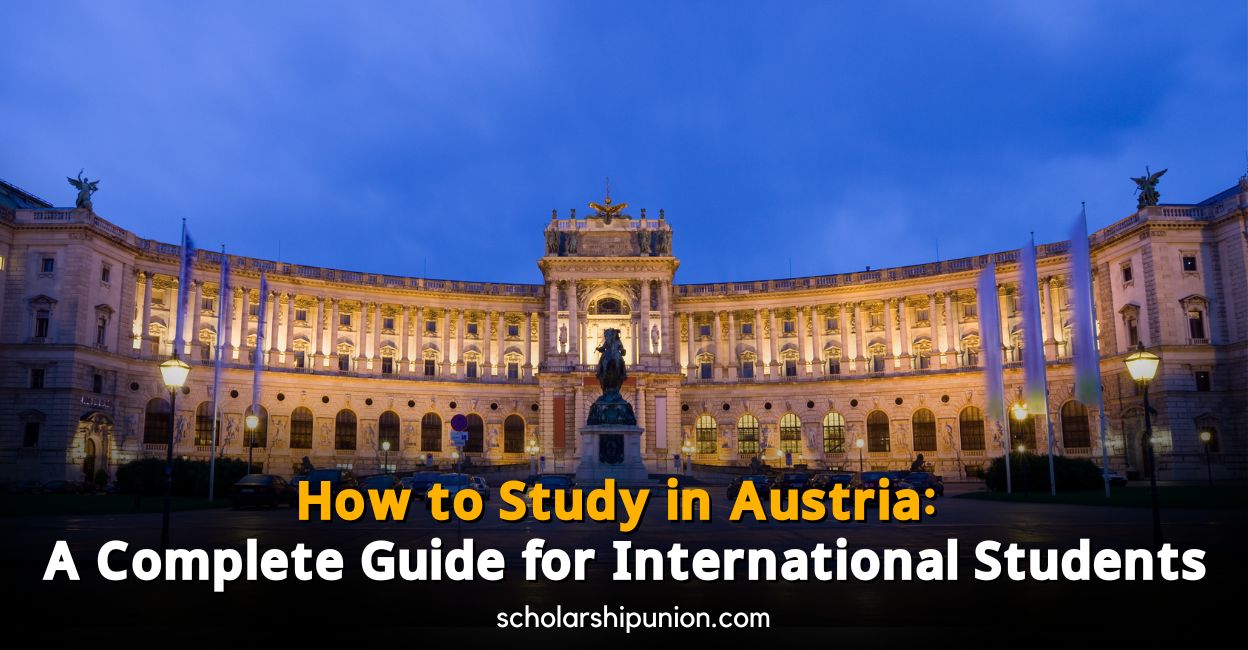How to Study in Austria: A Complete Guide for International Students
Thouhedul Islam
30 October 2024
691 views

Austria is a top destination for international students, offering high-quality education in a culturally rich and beautiful environment. Known for its prestigious universities, affordable tuition fees, and vibrant student communities, Austria provides a well-rounded academic experience for students from around the world. This guide covers everything you need to know about studying in Austria, from choosing a program and understanding admission requirements to applying for scholarships and navigating life as a student.
Why Study in Austria?
- High-Quality Education: Austria is home to globally recognized universities like the University of Vienna, Vienna University of Technology, and Graz University of Technology.
- Affordable Tuition Fees: Public universities in Austria offer relatively low tuition fees, especially for EU/EEA students. International students from non-EU countries also enjoy reasonable rates compared to other European countries.
- Cultural Experience and Location: Austria’s central location in Europe makes it a cultural and travel hub, allowing students to explore neighboring countries easily.
- Research and Innovation: Austrian universities emphasize research and innovation, making it a great destination for those pursuing advanced studies in sciences, engineering, and humanities.
Types of Degrees and Programs Available
- Bachelor’s Programs: Austrian bachelor’s degrees typically last three years and are offered in a variety of fields.
- Master’s Programs: Lasting two years, master’s programs are available in both English and German, with a wide selection in fields like business, science, and engineering.
- Doctoral Programs: Doctoral degrees usually span three years and are research-focused, allowing students to collaborate with experts and contribute to academia.
Eligibility Criteria
- Academic Requirements: For a bachelor’s degree, students need a high school diploma or equivalent. For a master’s, a recognized bachelor’s degree is required.
- Language Requirements: Programs taught in German usually require a German language certificate (such as ÖSD, Goethe, or TestDaF), while English programs may require IELTS or TOEFL scores.
Application Process
- Finding a Program: The Study in Austria portal and individual university websites are excellent resources for finding programs that suit your academic goals.
- Required Documents:
- Academic Transcripts: High school diploma or bachelor’s degree, depending on the program.
- Language Proficiency Proof: Either German or English, depending on the language of instruction.
- Motivation Letter: This should explain why you are interested in studying in Austria and your specific program.
- Letters of Recommendation: From professors or employers, particularly if you are applying for a master’s or doctoral program.
- Application Deadlines: Deadlines vary by institution, but they generally fall in March for winter semester intake and October for summer semester intake.
Student Visa Process
- Visa Requirements: Students from non-EU/EEA countries will need a student visa (Visa D for stays over six months) to study in Austria. You can apply at the Austrian embassy or consulate in your home country.
- Residence Permit: After arriving in Austria, students must apply for a residence permit at their local municipal office (Magistrat). Documents required typically include proof of enrollment, financial means, health insurance, and accommodation.
- For more details: Visit the Austrian Visa and Residency Guide.
Scholarships and Financial Aid
- Government Scholarships: The OeAD (Austrian Agency for International Cooperation in Education and Research) offers a variety of scholarships for international students.
- University Scholarships: Many Austrian universities provide merit-based scholarships, so check your university’s financial aid office for details.
- External Scholarships: Scholarships like the Erasmus+ program and Ernst Mach Grant support students with financial assistance, and they can be highly competitive.
For scholarship details, visit the Austrian Scholarships Database.
Cost of Living in Austria
- Accommodation: Monthly rent ranges from €300 to €600, depending on the city and housing type.
- Transportation: A monthly public transport pass is around €30-€50, with discounts for students.
- Food and Other Expenses: Plan for around €250-€350 for food and leisure activities. Austria offers discounts and affordable dining options for students, especially in university areas.
Life in Austria as an International Student
- Language and Culture: While German is the official language, Austria has a diverse culture and many people speak English, especially in cities like Vienna and Salzburg.
- Student Communities and Networking: Universities in Austria often have active student clubs and international student networks, which can be helpful for integrating into the academic and social environment.
Post-Graduation Opportunities
- Stay-Back Options: Austria offers a Red-White-Red Card program, allowing international graduates to stay for up to 12 months after completing their studies to look for a job.
- Job Market and In-Demand Industries: Austria has a robust job market, especially in engineering, tourism, and environmental sciences. EU residency rights provide additional career flexibility within Europe.
Conclusion
Studying in Austria offers a balanced mix of quality education, affordable living, and unique cultural experiences. With accessible scholarships, a central European location, and a vibrant academic environment, Austria is an excellent choice for international students looking to gain a valuable education.
For more information and to explore specific programs, visit Study in Austria.